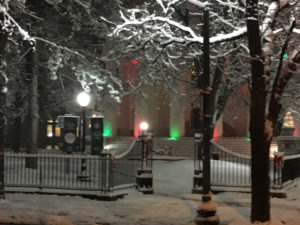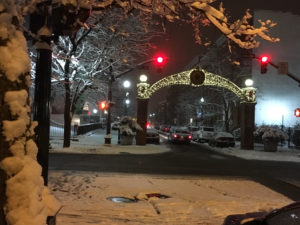I drove home from the off-campus Athletic Hall of Fame Induction in the first snowfall of the year, a gentle one, about 2-3 inches. Back in Troy, I wound through the quiet nighttime Russell Sage campus with the snow still pristine. The holiday lights glowed like jack-o-lanterns beneath coats of snow; the illuminated Russell Sage archway looked mysteriously inviting. Even the traffic lights seemed festive.
I’ll have plenty of time to get tired of the snow and its inconveniences. But the season’s first snow always has a distinct aura. Why do people talk so much about the weather? In part because it affects us all and shapes our perceptions: seasonal changes emphasize our common humanity. The power of nature and the regularity of its changes as the earth tilts toward or away from the sun remind us of our smallness. (See this fine essay on the Winter Solstice, from a pilot’s point of view).
I remembered my first rainy quarter in graduate school translating Anglo-Saxon passages clumsily most every night. One passage that stayed with me—so different from the bloody battle poems—came from the Old English version of the Venerable Bede, and it invoked the sparrow that flits through a warm feasting hall, passing from dark winter on one end back to dark winter as it exits the other.
“When we compare the present life of man on earth with that time of which we have no knowledge, it seems to me like the swift flight of a single sparrow through the banqueting hall where you are sitting at dinner on a winter’s day with your thanes and counselors. In the midst there is a comforting fire to warm the hall; outside, the storms of winter snow are raging. This sparrow flies swiftly in through one door of the hall, and out through another. While he is inside, he is safe from the winter storms; but after a few moments of comfort, he vanishes from sight into the wintry world from which he came. Even so, man appears on earth for a little while; but of what went before this life or of what follows, we know nothing. “
Our winter celebrations still retain this primeval urge to gather around warmth and light, an urge intensified precisely when it is cold and dark.
Thirteen hundred years after Bede’s parable of the sparrow, James Joyce published “The Dead,” a story of a New Year’s /Twelfth Night party on an unusually snowy Dublin night. The main character admires the warmth of the Irish hospitality on display but never feels part of it. The party hosts are looking aged, and his wife sadly recalls a young lover who sang to her in the freezing cold and died shortly after. In the final moments of the story, the main character looks out at the gathering snow, and Joyce famously attempts to echo mood and sound in a description of the snowfall covering all the landscape and humanity. It’s hard to see snow the same way afterwards:
“A few light taps upon the pane made him turn to the window. It had begun to snow again. He watched sleepily the flakes, silver and dark, falling obliquely against the lamplight. The time had come for him to set out on his journey westward. Yes, the newspapers were right: snow was general all over Ireland. It was falling on every part of the dark central plain, on the treeless hills, on the Bog of Allen and, farther westward, softly falling into the dark mutinous Shannon waves. It was falling, too, upon every part of the lonely churchyard on the hill where Michael Furey lay buried. It lay thickly drifted on the crooked crosses and headstones, on the spears of the little gate, on the barren thorns. His soul swooned slowly as he heard the snow falling faintly through the universe and faintly falling, like the descent of their last end, upon all the living and the dead.”
There’s a lot going on in that famous passage, but one element is very familiar: snow erases boundaries and creates a temporary illusion of oneness. That’s probably what the great poet, Richard Wilbur, who died earlier this year, was thinking of in “First Snow in Alsace,” his poem about World War Two, in which
It falls on bombed out houses and munition dumps and bodies recently killed, and then a young soldier returns from sentry duty:
“Ten first snows back in thought”: seasons mark time and memory for us. For me, this one will be remembered in the holiday lights of my first winter on the Russell Sage campus with traffic lights echoing the columns of red and green from Bush Memorial.



